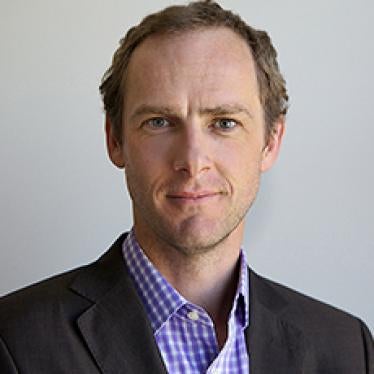It was late afternoon when a pick-up truck carrying Colonel Ismael Hadjarou and a dozen of his heavily-armed Seleka soldiers pulled up outside a church in the town of Bouca, in northern Central Africa Republic. I watched as they jumped from their vehicle and quickly fanned out to surround the church, blocking off the only exit.
Inside the building, 3,000 civilians were hiding in silent terror. Colonel Hadjarou stepped into the church and began to address the cowering, wide-eyed crowd. The Colonel spoke briefly, and delivered his simple but chilling message: “If there are still people here at 8am tomorrow, we will shoot them down and we will burn the mission.”
I happened to be in Bouca that day to investigate the destruction of hundreds of homes and dozens of civilian killings, and stumbled upon this scene by chance. As I stepped forward to ask what was happening, a Seleka fighter lifted his gun at me. I stopped in my tracks, but instantly knew there was no way I could leave. I spent the next two days at the church, working frantically with colleagues from humanitarian groups to try to prevent an atrocity from unfolding.
Massacres like the one threatened in Bouca are happening all over the Central African Republic (CAR). But only recently has the world started to take note. Journalists, who just a few weeks ago would have struggled to place CAR on a map, have poured into the country to cover the recent flurry of violence that’s gripped both the capital Bangui and other provinces.
Since seizing power in March, the Seleka, a mostly Muslim alliance of rebel groups, have indiscriminately killed scores of civilians, engaged in rampant looting, and burned countless villages to the ground. Michel Djotodia, the rebel leader who formally became president in August, officially disbanded the Seleka in September; they are now widely referred to as ex-Seleka and are nominally integrated into the national army.
But local armed groups known as the anti-balaka then began to rise up against the Seleka. The anti-balaka (literally ‘anti-machete’) have indiscriminately attacked and killed Muslim civilians, equating all Muslims with the Seleka. Despite a history of Muslims and Christians living together peacefully in CAR, the anti-balaka told me first-hand that all Muslims must die.
To those of us who have been closely following CAR's conflict month by bloody month, it's clear the crisis has reached tipping point. Violence across the country is increasing, but the level of brutality is rising too. Civilians are burned alive in their homes; children's throats are slit. Both sides share responsibility for these abuses.
Last weekend alone, up to 500 people were killed in Bangui; extra French troops were flown in to help restore law and order. But despite the grave loss of life, there is one ray of hope: the international community is finally paying attention to CAR and is acting rapidly.
The United States, a country with hitherto no interest in CAR outside helping to track down the notorious Ugandan warlord Joseph Kony in the south-east, has quickly stepped up to the plate. It announced this week that it would help airlift African Union (AU) peacekeepers into the country from elsewhere on the continent, and will also release funds to support the AU mission. France was quick to fly in extra troops when it became clear the scale of the slaughter was about to spiral, and has provided enormous support to the AU, whose troops are trying to prevent mass killings. The world’s diplomats are actively considering a UN peacekeeping force, and human rights monitors are about to be deployed.
The UK has commendably recognised that a humanitarian disaster is unfolding in CAR. But it can and should do more to urgently help protect civilians. It should support the deployment of a UN peacekeeping force. CAR is a country larger than France; the African Union peacekeepers are stretched thin and cannot be everywhere at once.
Britain should also offer logistical support to AU and French forces, securing access for aid workers to assist the hundreds of thousands of people forced from their homes. It should provide medical facilities to support the AU and French missions. It should make all parties in CAR aware that they will be held accountable for their crimes. And it should call for targeted individual sanctions on those orchestrating the abuses.
Happily for the 3,000 Christians I saw crammed into the church back in Bouca, after two days of intense negotiations, AU soldiers finally arrived in the town, before Colonel Hadjarou could make good on his threat.
Seeing the relieved civilians at Bouca’s church compound, I couldn't help but think about the many communities suffering in silence in the Central African Republic – those out of reach of peacekeepers. Who is going to protect these people? And who will bear witness to the next massacre?








